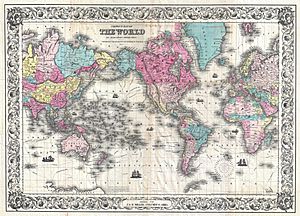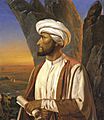1852 facts for kids
The year 1852 was a special year because it was a leap year. This means it had an extra day, February 29th. It started on a Thursday in the Gregorian calendar, which is the calendar most of the world uses today.
Contents
Important Events of 1852
Many important things happened around the world in 1852. New hospitals opened, famous books were published, and leaders changed.
January to March: New Beginnings
- January 14 – In France, Louis-Napoleon Bonaparte created a new set of rules for the country. He was the President of the French Second Republic at the time.
- January 15 – In New York City, nine men started a group that would later become the famous Mount Sinai Hospital.
- January 17 – The United Kingdom officially said that the Transvaal in South Africa was an independent country.
- February 15 – The Great Ormond Street Hospital for Sick Children in London opened its doors. It welcomed its very first patient, helping children who were ill.
- February 16 – The Studebaker Brothers Wagon Company was started. They would later become famous for making cars.
- February 25 – A ship called the HMS Birkenhead sank near Cape Town, South Africa. Out of 643 people on board, only 193 survived.
- March 20 – The very important book Uncle Tom's Cabin by Harriet Beecher Stowe was published. This book helped change how people thought about slavery.
April to June: Conflicts and Changes
- April 1 – The Second Burmese War began. This was a conflict between the British and Burma.
- April 18 – During the Taiping Rebellion in China, Taiping forces started to surround the city of Guilin.
- May 19 – The siege of Guilin ended.
- June 12 – Taiping forces entered the region of Hunan in China.
July to September: Speeches and Inventions
- July 1 – Henry Clay, a well-known American statesman, was the first person to have his body honored by lying in state in the United States Capitol rotunda.
- July 4 – Frederick Douglass, a famous speaker and writer, gave his important speech "The Meaning of July Fourth for the Negro" in Rochester, New York.
- August 3 – The first ever Boat Race between Yale and Harvard universities took place. This was the first time two American colleges competed in a sport.
- September 24 – French engineer Henri Giffard made the first successful trip in an airship. He flew from Paris to Trappes.
October to December: New Leaders and Empires
- November 2 – In the U.S. presidential election, Democrat Franklin Pierce from New Hampshire won. He defeated Whig Winfield Scott.
- November 4 – Count Cavour became the prime minister of Piedmont, a region in Italy.
- November 11 – The new Palace of Westminster opened in Britain. This is where the British Parliament meets.
- December 2 – Napoleon III officially became the Emperor of the French. This marked the start of the new French Empire.
- December 23 – The Taiping army took over Hanyang in China and began to surround Wuchang.
- December 29 – The Taiping army also took over Hankou.
Other Events of 1852
- The Devil's Island prison colony opened.
- In Hawaii, sugar farmers brought the first Chinese workers to help on their farms.
- Loyola College was officially started in Baltimore, Maryland.
- Antioch College was started, with Horace Mann as its first president.
- Mills College was also started.
- Leo Tolstoy's first novel, Childhood, was published as a book.
Famous People Born in 1852
Many important people were born in 1852 who would later become famous scientists, artists, and leaders.
January to June Births
- January 11 – Konstantin Fehrenbach, who would become a Chancellor of Germany.
- February 16 – Charles Taze Russell, a well-known Protestant religious leader.
- April 13 – F.W. Woolworth, an American businessman who started many stores.
- May 1 – Santiago Ramón y Cajal, a Spanish scientist who won the Nobel Prize in Physiology or Medicine for his work on the brain.
- May 4 – Alice Pleasance Liddell, who inspired the famous children's book Alice's Adventures in Wonderland.
- May 31 – Julius Richard Petri, a German scientist who invented the Petri dish, used in labs.
- June 25 – Antoni Gaudi, a famous Spanish architect known for his unique buildings.
July to December Births
- July 12 – Hipólito Yrigoyen, who became the President of Argentina.
- August 30 – Jacobus Henricus van 't Hoff, a Dutch chemist who won the first Nobel Prize in Chemistry.
- September 12 – Herbert Henry Asquith, who became the Prime Minister of the United Kingdom.
- September 28 – Henri Moissan, a French chemist who won a Nobel Prize in Chemistry.
- October 2 – William Ramsay, a Scottish chemist who won a Nobel Prize in Chemistry.
- October 9 – Hermann Emil Fischer, a German chemist who won a Nobel Prize in Chemistry.
- November 3 – Prince Mutsuhito of Japan, who would later become Emperor Meiji.
- November 22 – Paul-Henri-Benjamin d'Estournelles de Constant, a French diplomat who won the Nobel Peace Prize.
- December 15 – Henri Becquerel, a French physicist who won a Nobel Prize for discovering radioactivity.
- December 19 – Albert Abraham Michelson, a German-born physicist who won a Nobel Prize for his work on light.
Notable People Who Died in 1852
The year 1852 also saw the passing of several important figures.
January to June Deaths
- January 6 – Louis Braille, a French teacher who invented the braille system, which helps blind people read and write.
- March 4 – Nikolai Gogol, a famous Russian writer.
- June 29 – Henry Clay, an important American statesman.
July to December Deaths
- September 14 – Augustus Pugin, a well-known English architect.
- September 14 – Arthur Wellesley, 1st Duke of Wellington, a famous British general and former Prime Minister of the United Kingdom.
- October 24 – Daniel Webster, an important American statesman.
- November 27 – Augusta Ada King, Countess of Lovelace, an early English computer pioneer.
Images for kids
| Millennium: | 2nd millennium |
|---|---|
| Centuries: | 18th century – 19th century – 20th century |
| Decades: | 1820s 1830s 1840s – 1850s – 1860s 1870s 1880s |
| Years: | 1849 1850 1851 – 1852 – 1853 1854 1855 |
See also
 In Spanish: 1852 para niños
In Spanish: 1852 para niños

All content from Kiddle encyclopedia articles (including the article images and facts) can be freely used under Attribution-ShareAlike license, unless stated otherwise. Cite this article:
1852 Facts for Kids. Kiddle Encyclopedia.


















